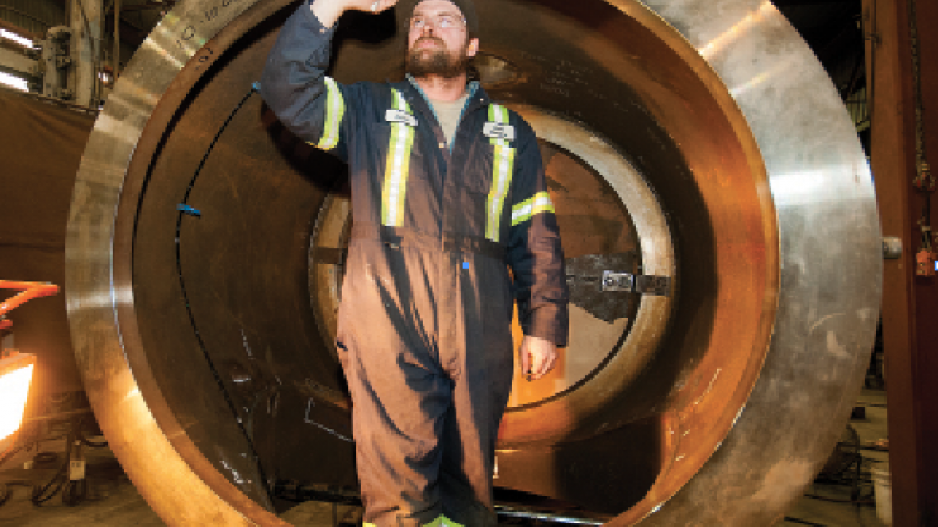Cheap oil and a weak loonie may be generally good for B.C. businesses, especially exporters, but some B.C. companies that sell equipment and services to the oilsands are feeling the pinch.
Energy companies have shelved a number of new oilsands projects and expansions in Alberta and have been parking oil rigs. B.C. companies like Ideal Welders Ltd. in Delta have seen an almost immediate impact.
“Absolutely, yes, we’re seeing a slowdown,” said Dale Hamill, Ideal Welders’ vice-president of operations.
“In excess of $50 million worth of work has been shelved over the next five years that we were planning on being awarded. There is a significant impact. Projects that are still going ahead have been clawed back as far as timing or how fast they want to move on them.”
Ideal Welders is in a space that is accustomed to business rising and falling with commodity price cycles and other economic factors. But what’s striking about the clawbacks in Alberta oilsands projects is how abrupt it has been.
Hamill said his company had clients in December tour Ideal Welders’ fabrication shop on Annacis Island, where modular structures are prefabricated, then shipped for assembly on site.
“They were in our facility on December 16, about eight of them, touring, doing the final negotiations for a large contract. Received a phone call while we were doing our tour. They were called into the boardroom – conference call saying, ‘Pack up your bags, everything’s off the table.’ That’s in our boardroom they take this call.”
Before the clawbacks started happening in December, the company employed between 110 and 120 welders. It’s now down to about 60.
Other B.C. companies that are likely to feel the impact of the dramatic curtailment in Alberta oil projects are those that sell or lease heavy machinery and equipment to the oil and gas, mining and forestry sectors, like Finning International Inc. (TSX:FTT).
Finning’s Mauk Breukels, vice-president of investor relations, said he could not divulge details on sales, because the company is in a blackout period until it reports its quarterly earnings on February 19.
However, he confirmed that the Alberta oilsands account for $1 billion in sales annually (about one-seventh of the company’s annual revenue) and that a scaling back on new oilsands projects is likely to affect sales.
“You’re seeing that a lot of these oil and gas producers and contractors [are] announcing reductions in capital expenditures,” Breukels said, “so dealers like us are likely impacted by those types of decisions, as capital expenditures would often include equipment.”
However, he added that existing oil wells and oilsands operations appear not to have experienced any significant curtailments.
“Generally, it seems that production levels have kept up, which means that the equipment continues to run and continues to need product support, which is important to us.”
Fortunately for Finning, it’s diversified enough that dips in one sector or region can be offset in other regions or sectors – forestry, for example.
“Forestry’s doing very well,” Breukels said.
Falcon Equipment, which sells mobile crane trucks, has been reducing inventory of products that are specific to the oil industry.
“Certainly the level of interest has dwindled a little bit for obvious reasons,” said Falcon Equipment marketing manager Andrew Grant.
Falcon’s crane trucks sell for between $400,000 and $1 million. Grant said the contractors that Falcon sells to have been refocusing from oil to natural gas and other sectors.
While Falcon is expecting lower sales in the oil sector, it does not expect that will affect its cash flow, because it means it has to buy less equipment from the U.S., which is currently costing a premium, due to the strong U.S. dollar and its weak Canadian counterpart.
Tycrop is another B.C. company that relies on the oil and gas sector for much of its business; it makes trailers and mobile equipment for the oil and gas sector.
It recently opened a new remanufacturing plant in Alberta. To date, the company has not seen a downturn in business.
“Potentially, in 2016, we could, depending on what the market does then, but right now it’s been really steady and good,” said Jeremy Giesbrecht, branding and communications officer for Tycrop.



